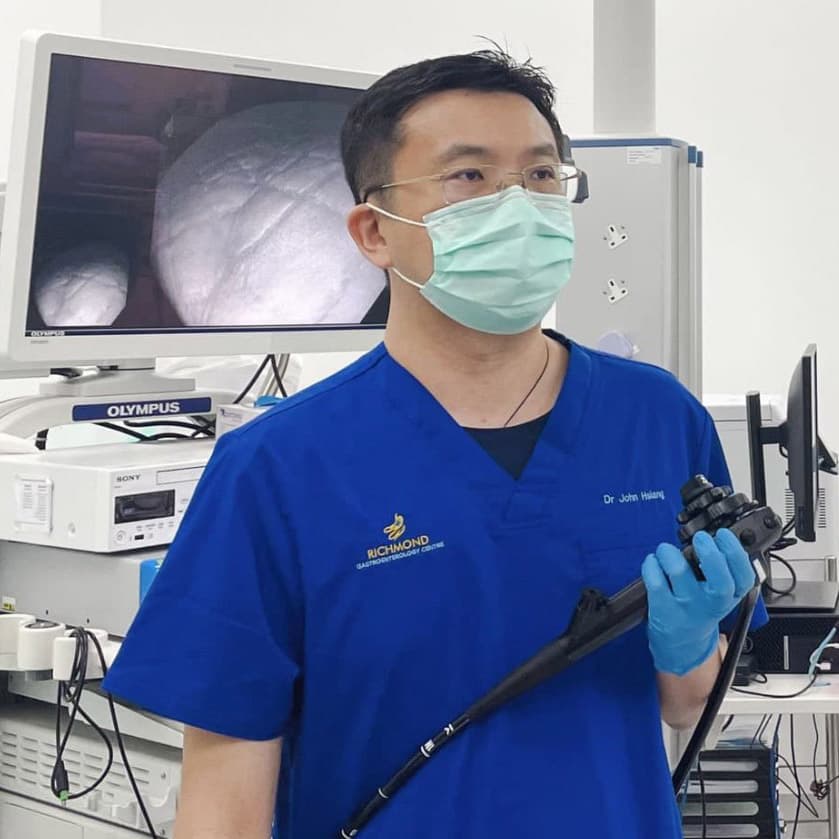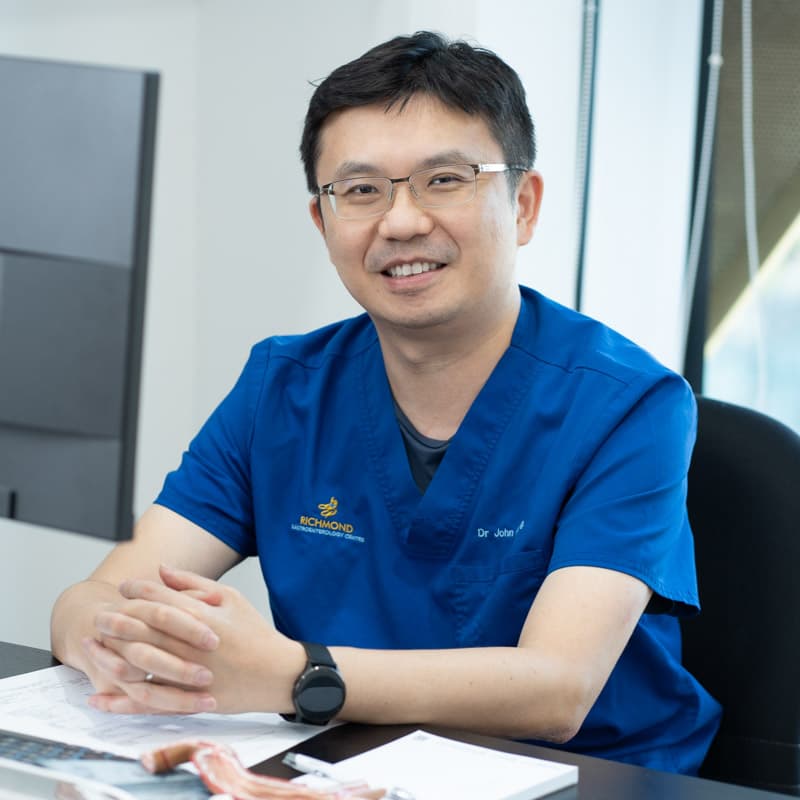Colonoscopy
A colonoscopy is a procedure used to examine the inside of the large intestine (colon and rectum) for abnormalities such as polyps, pre-cancerous changes or signs of cancer.
Richmond Gastroenterology Centre

Dr. John Hsiang
MBChB (NZ), FRACP (Australasia), MD (Doctorate), FRCP (Edinburgh), FAMS (Gastro)
Dr. John Hsiang is a distinguished gastroenterologist in Singapore with extensive training and experience in digestive health. He obtained his Fellowship of the Royal Australasian College of Physicians in Gastroenterology in 2012 and holds a PhD in viral hepatitis and fatty liver disease research.
He provides care for a broad range of digestive and liver concerns, combining thorough evaluation with tailored management to support patients’ long-term well-being.
Dr Hsiang is skilled in performing gastroscopy (upper endoscopy) and colonoscopy to investigate symptoms, detect stomach and colon cancers at an early stage, and provide timely treatment options.
With a commitment to individualised care, he applies an evidence-based approach that prioritises accuracy, effectiveness and patient comfort at every stage of diagnosis and treatment.
Languages Spoken:
English, Mandarin and Hokkien
Fellowship Trained Specialist
20+ Years of Clinical Experience

What is a Colonoscopy?
Colonoscopy is a key procedure for detecting colorectal cancer in its early and more treatable stages. It not only aids in diagnosis but also plays a preventive role.
Regular screening allows doctors to identify and remove polyps before they become cancerous, significantly reducing the risk of progression to cancer.
In Singapore, colorectal cancer is the most common cancer among men and the second most common among women.
How a Colonoscopy is Performed
A colonoscopy is a procedure used to examine the inside of the large intestine (colon and rectum) for abnormalities such as polyps, pre-cancerous changes or signs of cancer.
During the procedure, a thin, flexible tube called a colonoscope is gently inserted through the anus and guided through the colon. Attached to the colonoscope is a camera that provides a clear, real-time view of the intestinal lining.
This allows the specialist to inspect the inner lining of the colon and, if necessary, remove polyps or perform a biopsy to collect tissue for further analysis.
When is a Colonoscopy Necessary?
Colorectal cancer is the leading cancer in Singapore for both men and women. Fortunately, it is also among the most preventable with timely detection.
A colonoscopy may be recommended for both screening and diagnostic purposes, depending on your age, symptoms or risk profile.
In Singapore, individuals aged 50 and above are generally advised to undergo routine screening due to an increased risk of colorectal cancer with age.
Your doctor may also recommend a colonoscopy if you experience:
- Persistent changes in bowel habits, such as diarrhoea or constipation
- Unexplained abdominal pain or bloating
- Blood in the stool or rectal bleeding
- Unexplained weight loss or anaemia
- A family history of colorectal cancer or polyps
Individuals with inflammatory bowel disease (IBD), such as ulcerative colitis or Crohn’s disease, may also require earlier and more frequent surveillance.
Even if you have no symptoms, a colonoscopy can help detect and remove polyps before they turn cancerous, making it an important part of preventive care.
< 50 year olds
30 mins
Outpatient Procedure
Same‑day discharge: After the procedure, you’re monitored for around 30 – 60 minutes while the sedation wears off, and then you can go home the same day – no overnight hospital stay required.
What to Expect Before, During and After a Colonoscopy
Before the Colonoscopy
- Expect clear bowel prep instructions, including a low-fibre diet days prior.
- A bowel preparation (laxative) is typically taken the day before to ensure the colon is fully cleared.
- Certain medications may need to be paused – your doctor will advise accordingly.
- Arrange for someone to accompany you, as sedation may make you drowsy afterwards.
On the Day of the Colonoscopy
- Fasting for several hours beforehand is usually required.
- The procedure is performed under mild sedation to ensure comfort.
- A thin, flexible tube with a camera (colonoscope) is gently inserted through the anus and advanced through the colon.
- The specialist examines the inner lining of the colon and may remove any polyps or perform a biopsy if necessary.
After the Colonoscopy
- You will be monitored until the sedation wears off and can usually return home the same day.
- Mild cramping or bloating may occur but typically resolves within a few hours.
- Normal eating can resume once advised, usually soon after the procedure.
- The results will be shared with you, and further follow-up will be arranged if needed.
What to Expect: Your Colonoscopy Step-by-Step
Experiencing digestive symptoms or due for screening? A colonoscopy is an important step in detecting conditions such as polyps, inflammation or colorectal cancer early.

Make an Appointment
Pre-Procedure Consultation
Undergoing the Colonoscopy
Post-Procedure Care and Follow-Up
Patient Information
How Safe is a Colonoscopy?
A colonoscopy is generally considered a safe and well-established procedure when performed by experienced specialists. It is routinely used worldwide for colorectal cancer screening and investigating digestive symptoms.
Gastroenterologists undergo advanced training in performing endoscopic procedures, ensuring precision, care and safety.
Complications are rare, but as with any medical procedure, there are potential risks that may include:
- Mild abdominal discomfort or bloating after the procedure
- Reactions to sedation
- Bleeding, especially if a polyp is removed
- Perforation (a small tear in the colon wall), which is uncommon, occurring in fewer than 1 in 1,000 procedures
To ensure safety, patients are carefully assessed beforehand, and the procedure is carried out under close monitoring using sterile, high-standard equipment.
For most individuals, the benefits of early detection and prevention far outweigh the risks. If you have any specific concerns, your doctor will discuss them with you prior to the procedure.
Insurance Coverage for Colonoscopy in Singapore

In Singapore, the cost of a colonoscopy can generally be covered by both insurance and MediSave, particularly when the procedure is medically indicated.
Depending on your health insurance plan, you may be eligible for pre-authorisation. This helps confirm coverage and reduces out-of-pocket expenses at the time of admission.
Before your procedure, our clinic staff can assist with the necessary paperwork and guide you through the insurance or MediSave claims process. For specific coverage details, please check with your insurance provider.
Is a colonoscopy painful?
Colonoscopy is usually performed under sedation, so most patients experience minimal discomfort and often do not recall the procedure.
How long does the procedure take?
A colonoscopy typically takes around 20 to 30 minutes. You may need a few hours in total, including recovery from sedation.
What is the difference between a colonoscopy and a gastroscopy?
A colonoscopy examines the large intestine (colon and rectum), while a gastroscopy focuses on the oesophagus, stomach, and duodenum.
They investigate different parts of the digestive tract and may be recommended together depending on your symptoms.
Will I need someone to accompany me after the procedure?
Yes. Because sedation is typically used, it’s advised to have someone accompany you home, as you may not be alert enough to drive or take public transport alone
Can I eat after the colonoscopy?
You may resume eating light meals a few hours after the procedure, unless otherwise advised by your doctor. Avoid alcohol or heavy food until the sedation fully wears off.
How soon will I receive my colonoscopy results?
Initial findings may be shared immediately after the procedure. If biopsies or polyps are taken, lab results may take a few days. Your doctor will arrange a review to discuss the findings.
What if polyps are found during my colonoscopy?
If polyps are detected, they are often removed during the procedure and sent for lab analysis. Most polyps are benign, but some may have the potential to develop into cancer over time.
Is bowel preparation really necessary?
Yes. Proper bowel prep ensures clear visibility of the colon lining, which is essential for accurate diagnosis. Inadequate preparation may lead to missed findings or the need to repeat the procedure.
Can I go back to work the next day?
Consult Our Specialist
Experiencing digestive symptoms or discomfort? Speak to our gastroenterologist for a clearer understanding of your condition and treatment options.
You may book an appointment using our contact form or call the clinic at 6517 9958










